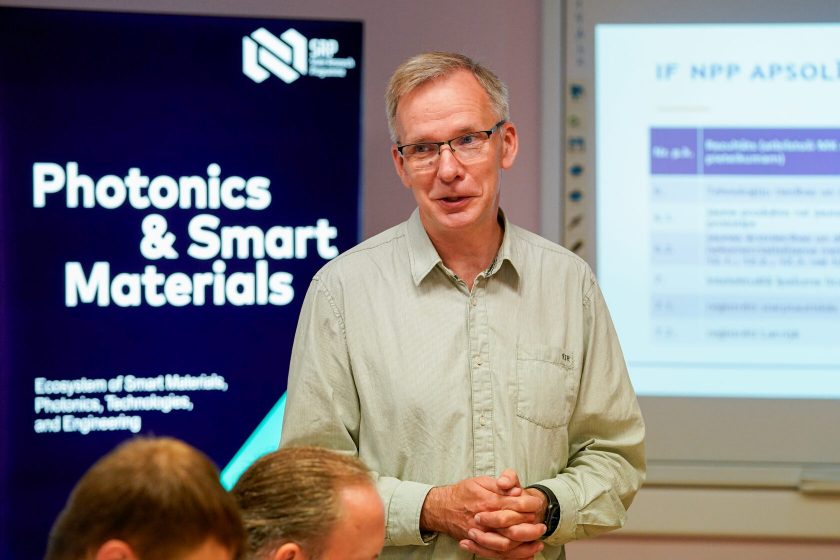
Although summer is traditionally a quieter time when most people try to regain their strength by taking advantage of their holidays, before the solstice the participants of the National Research Programme project “Smart Materials, Photonics, Technologies, and Engineering Ecosystem” managed to gather together in the welcoming premises of the Electronics and Computer Science Institute of the University of Latvia for the quarterly general meeting to reflect on the project’s achievements.
At the general meeting, project participants representing the Solid State Physics Institute of the University of Latvia, Riga Technical University, the Electronics and Computer Science Institute of the University of Latvia, the Latvian Biomedical Research and Study Centre, The Latvian State Institute of Wood Chemistry and the Rezekne Academy of Technologies presented the technologies being worked on within the project, identified various challenges and discussed the next tasks to be carried out within the project.
The project has produced the first significant prototypes and visible results, which will eventually open up new opportunities for the whole world, and it is planned that negotiations on the commercialisation of these prototypes will be launched at any moment. Also, by involving young scientists and students, the researchers working on this project have produced and published research articles in international scientific journals and contributed to conference proceedings (e.g. on sites such as Scopus and WoS).
In the coming months, the partners will continue to work on several important aspects of the project in the framework of the PPP project “Ecosystem for Smart Materials, Photonics, Technology and Engineering”. In particular, collaboration with other European partners will be promoted, including Nanopharma (Czech Republic), the NanoBioMed Centre (Poland) and the IEM (Institut Européen des Membranes) CNRS (France).
The scientists involved in the project will also continue to carry out various tests, optimise working methods, optimise the performance of experimental stands, present their results at international conferences and publish relevant papers in the scientific journals of these conferences. At the same time, monitoring solutions for the currently developed infrastructure will be tested and validated. It is also planned to work on improving the design and ergonomics of the prototypes developed.
Although the partners involved in the project have already achieved a lot, there are still just as many challenges ahead. However, representatives of all four research strands of the project expressed their commitment to achieving all the objectives of the project at the last quarterly project meeting.
The project is implemented under the national research programme “Innovation Fund – Sectoral Research Programme” established by the Ministry of Economy. Its aim is to promote scientific research, cooperation between scientific institutes, universities and industry, to facilitate and support technology transfer, the development of innovative and commercialised products and technologies in line with industry needs.

The research is funded by the Latvian Council of Science within the project “Smart Materials, Photonics, Technologies, and Engineering Ecosystem” (NRP-EM-FOTONIKA-2022/1-0001).